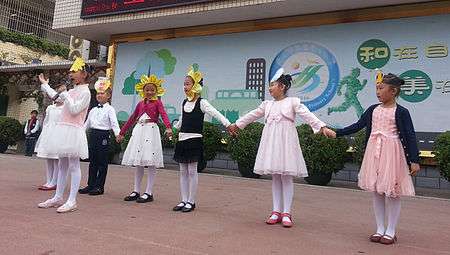Humane education

Humane education is usually defined as the use of education to nurture compassion and respect for living things.[1][2] In addition to a traditional focus on the treatment of non-human animals, humane education also increasingly contains content related to the environment, the compassionate treatment of other people, and the interconnectedness of issues pertaining to people and the planet.[3]
History
Humane education as a discrete field of education was created in the late 1800s by individuals like George Angell as an attempt to prevent cruelty to animals before it started[4] along with the formation of SPCAs, such as the Massachusetts SCPA and the ASPCA. The formation of humane education and animal protection/welfare organizations was associated with the expansion of women’s suffrage and the temperance movement, and many of those involved in creation and early advocacy of humane education also worked in those other areas of social change as well.[3] These early activists successfully advocated for the passage of laws supporting or even requiring the teaching of humane education in schools,[4] and many teachers did teach it.[5] The animal welfare organizations also visited schools and other youth centers to teach “push-in” programs that supplemented—and possibly augmented—the children’s other education.
In addition to school-based programs and activities, humane education was initially conducted as well through Bands of Mercy; although these have been disbanded, humane education continues to be conducted in community-based settings. These include animal shelters, humane education centers and parks as well as, e.g., Boys and Girls Clubs, YWCAs and YMCAs, cultural and religious centers, etc.
Currently, humane education is primarily conducted by animal welfare organizations—such as the Humane Society of the United States (HSUS)—and organizations that include humane education among their primary focuses—such as the Latham Foundation, the Association of Professional Humane Educators (APHE), and International Network for Humane Education (InterNICHE).[1]
General Goals, Content, and Pedagogical Strategies
Humane education often looks to help the compassion and concern that children and adolescents have towards one group be extended to other groups. One of the beliefs that helped establish humane education as a field has been that helping children learn to treat animals with kindness will encourage them to grow up to be adults who are kind to all animals, human and non-human.[6] This “cross-fertilization” of kindness is also used, e.g., to try to have the care children have for their own pets be extended to animals in their community, animals in circuses, animals on factory farms, or to show how reducing pollution in one’s neighborhood can help ecosystems far away.[7]
Typical Current Content
In addition to the humane treatment of domestic animals, humane education now often examines broader issues including human relationships and animal exploitation. Common topics currently covered include responsible pet care (e.g., spaying/neutering and responsible adoption); factory farming; captive wild animals; understanding animal emotions, sentience, and communication; blood sports; bite prevention; ecological stewardship; the interconnectedness of life; pollution; reduction/reuse/recycling of materials; bullying; non-violent conflict resolution; critical thinking, child labor; and the effects of every-day activities on other people, animals, and the environment.
Pedagogical Strategies
Since the beginning, humane education has focused on what is now often called service learning and experiential learning.[1] Organizations that conduct humane education programs, therefore, often create community- or home-based activities in which students can learn humane education content and behaviors through experience and reflection.
Humane education programs are often ″pushed into″ classes in schools; a humane educator or the teacher of record will devote a class period to humane education content; in these cases, the lesson is often devoted wholly to teach humane education content (e.g., responsible pet or environmental care, spaying/neutering, respect for others).
Humane education may also be integrated into traditional lessons. Since most children and adolescents find animals and nature to be engaging topics, humane education can be an effective vehicle to also teach other content, such as literature, history, civics, or science. In an very loose way, this is what many children's books do when they caste animals as the main characters to convey other information, ideals, norms, etc.
See also
|
References
- 1 2 3 Unti, B. & DeRosa, B. (2003). Humane education: Past, present, and future. In D. J. Salem & A. N. Rowam (Eds.), The State of the Animals II: 2003 (pp. 27 – 50). Washington, D.C.: Humane Society Press
- ↑ Faver, C. A. (2010). School-based humane education as a strategy to prevent violence: Review and recommendations. Children & Youth Services Review, 32, 365 – 370.
- 1 2 Burnett, C. (2000). Humane education. Animals Today, 8, 18.
- 1 2 Preston, H. C. (1928). Milestones in humane education. Journal of Education, 107, 181.
- ↑ Morrill, W. M. (Nov. 11, 1920). Humane education and the teacher. Journal of Education, 100(2), 462.
- ↑ Thompson, K. L. & Gullone, E. (2003). Promotion of empathy and prosocial behaviour in children through humane education. Australian Psychologist, 38, 175 – 182.
- ↑ Samuels, W. E. (2007). Humane education: How to nurture empathy in children. Encyclopædia of Human-Animal Relationships: A Global Exploration of Our Connections with Animals (pp. 680 – 683), M. Bekoff and J. Nystrom (Eds.), Westport, CT: Greenwood Publishing Group.
Further reading
- Unti, B. & DeRosa, B. (2003). Humane education: Past, present, and future. In D. J. Salem & A. N. Rowam (Eds.), The State of the Animals II: 2003 (pp. 27 – 50). Washington, D.C.: Humane Society Press
- Hargreaves, S. (2015). Animal Hero Kids: Voices for the Voiceless. Stuart, FL: Animal Hero Kids
External links
- ACTAsia for Animals
- Animal Hero Kids
- The Association of Professional Humane Educators (APHE)
- Green Chimneys
- Humane Environmental Education (HEED®)
- Humane Education Advocates Reaching Teachers (HEART)
- Institute for Humane Education
- The Latham Foundation
- Humane Education at the MSPCA
- The National Humane Education Society